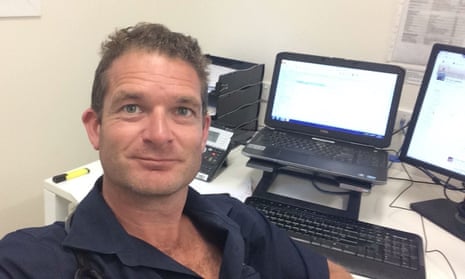A doctor on Nauru who blew the whistle on the deliberate medical neglect of refugees and asylum seekers on the island has been awarded a global award for free speech.
Dr Nick Martin, the former senior medical officer for International Health and Medical Services on Nauru, spoke out publicly against what he described as Australia’s “inflexible, unswerving, and shameless” offshore immigration regime, that deliberately harmed asylum seekers and ignored doctors’ recommendations to treat dangerously ill people.
In London on Wednesday night, he was awarded the 2019 Blueprint for Free Speech prize, an award previously won by Chelsea Manning, who revealed US military abuses and suspected war crimes in Iraq and Afghanistan, and John Kiriakou, the former CIA intelligence officer who revealed information about torture techniques including waterboarding.
Martin’s medical attention and advocacy for the most critically ill of his patients resulted in their transfer to Australia for treatment, but ultimately cost him his job with International Health and Medical Services – at the insistence of the Australian government’s Border Force, which resisted the medical transfers of any refugees or asylum seekers held offshore.
Subsequently, Martin’s reports and his medical attention formed key evidence presented to several successful federal court challenges that brought dangerously unwell children to Australia.
Some of the children brought to Australia by court order were as young as 10, and had attempted suicide on multiple occasions, but were still refused the treatment ordered by doctors by Australian government bureaucrats.
Several hundred children were being held indefinitely on Nauru when Martin spoke out publicly against the conditions under which they were forced to live, and the deliberate neglect in their healthcare. Now, there are fewer than 10 remaining.
Speaking at London’s Frontline Club, Martin said when he saw the extent of the damage being done to refugees and asylum seekers held in Australia’s offshore regime on Nauru he felt compelled to speak out, quoting the retired Australian army lieutenant general David Morrison: “The standard you walk past is the standard you accept.
“I had to look at myself in the mirror – ‘you knew this was happening and you didn’t say anything’.”
Martin said he was appalled to discover an offshore regime willing to risk the death of a refugee to uphold the government’s policy of keeping asylum seekers from Australia, concerned only with the public relations fallout of someone’s death.
“A child setting themselves on fire was unacceptable, but a young man hanging himself was acceptable, that was OK. You were trying to have a conversation with the Australian Border Force saying ‘this person is going to die’, and they were essentially saying ‘well, let’s see if you’re right’.”
Martin had an historical connection to Nauru before his term as a doctor there: his grandfather had been a doctor on the island during the second world war, and had been executed by the Japanese military in 1943 after he refused to evacuate and abandon his patients. Martin also served in the British navy as a surgeon, working on submarines. He said he never went to Nauru intending to become a whistleblower, and conceded he was scared at the possible repercussions of speaking out.
“Whenever people did get angry with me for speaking out, I would say ‘Is there anything I’ve said that’s not true?’ And they never had an answer to that.”
The Blueprint for Free Speech prizes are awarded to whistleblowers who expose serious corruption or wrongdoing in the public interest.
“Whistleblowing helps us take the ethical temperature of our society,” the Blueprint executive director Suelette Dreyfus said. “Are we covering up serious wrongdoing? Or bringing it into the light to fix it?”
The Melbourne-based Asylum Seeker Resource Centre was also recognised by Blueprint for its work aiding asylum seekers on Nauru and Manus Island, with a special recognition commendation. The organisation collated hundreds of medical records demonstrating that medical recommendations for asylum seekers and refugees were still being ignored.
Australia’s offshore immigration regime, where all asylum seekers who arrive by sea are sent, has been plagued by consistent revelations of physical violence – including murder – sexual abuse of women and children, allegations of torture by guards, medical neglect leading to death and endemic rates of mental health damage, self-harm and suicide attempts. Thirteen people have died in the offshore regime since it was reopened in 2012.
Martin told the London audience there was a moral imperative to speaking out against an unjust regime, and to ending indefinite offshore detention.
“Australia is diminished, this diminishes us all. There are people still in those places, still, after six years. I know there are issues around migration around the world, I understand that, but the Australian solution is not a solution at all.”
